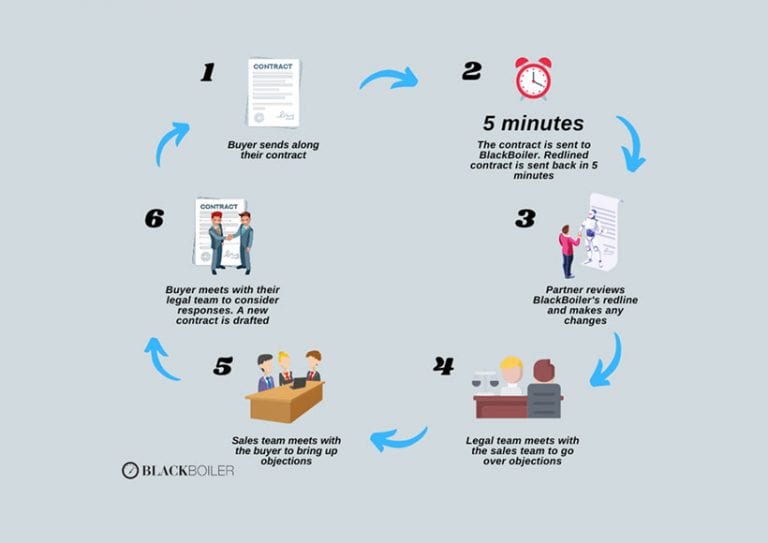How Organizations Leverage Automation to Speed Deal Velocity
By Dan Broderick
June 1, 2021

Dan Broderick is the CEO and co-founder of BlackBoiler, an AI-powered contract review company that uses proprietary deep learning and natural language processing to speed up the process of high-volume contract review for AmLaw 50 law firms and Global 1000 companies. dan@blackboiler.com
Published in Today’s General Counsel, June 2021
Closing deals is a critical part of any business, whether making new technology purchases, signing a lease or establishing a joint venture. Typically, closing contracts requires many hours of legal review — an inefficient, manual process that leaves both parties open to risk and lost profits. In fact, poor contracting approaches can waste hours of time and cost businesses up to nine percent of annual revenue. In some cases, lengthy involvement of the legal department can even result in lost opportunities.
One answer to improving deal velocity (the speed with which a company negotiates and signs a contract to close a transaction) is using AI to more quickly provide the solutions that customers and businesses are looking for. With the effects of Covid continuing to impact sales and transactions, every organization is looking for ways to close more deals faster and with less risk. Automated tools accomplish these goals by eliminating excess negotiation and repetitive markups, and allowing the legal team to streamline the process and be more consistent.
AI allows you to review and mark up contracts instantaneously, far faster than any member of the legal department could. AI also becomes “smarter” the more it is used, through user-enabled machine learning feedback loops. As the tool reviews more of the organization’s deals, the machine learning gains insights into how an organization reviews and marks up contracts to leverage in future contract reviews, while also improving the speed at which it reviews previously unseen contracts.
Global 1000 companies and other organizations of all sizes are increasingly turning to these types of automated tools to speed up deal velocity, minimize risk, and make the business a more attractive partner to other organizations.
By leveraging AI tools as part of contract review, general counsel will quickly see several benefits:
• Improve the bottom line. The costs of poor contracting processes quickly add up. After all, the faster a deal can be closed, the faster the revenue from the agreement can be captured. The advantages of AI have their greatest impact on certain types of common, repetitive contracts: services agreements, purchase orders, software as a service (SaaS) agreements, NDAs, licensing agreements, and sales and construction contracts.
Consider that some large corporations require at least two members of the legal team to review every contract, even ones that are similar to countless deals the company has closed before. When automated tools are used in the early round of reviews, you eliminate the need for the first set of eyes. This saves time and allows the human reviewer to start with a more consistent document.
• Reduce contract errors and oversights. Automated tools introduce a layer of consistency that humans simply cannot maintain across multiple contracts. Although AI cannot match the ability of an experienced attorney to make meaningful edits, it can treat routine provisions and language far more consistently. In the words of one general counsel involved with the contract review process, “If I knew I was making a mistake, I wouldn’t make it.”
As lawyers, when we don’t know what errors we are making, we don’t know what risks we are exposing the company to. Automated software provides insights into inconsistencies in the approach to risk. It allows the company to examine risk tolerance to design a review process that is far more consistent and aligns more closely with the company’s business objectives.
• Lead to stronger relationships with clients. Using automated tools in the contract review process also helps on the business side. As lawyers, we focus on what we know — the legal aspects. We don’t always appreciate the challenges faced by our colleagues in business and sales. We are also often more interested in creating the most efficient processes, and don’t necessarily have the time to understand the short and long-term goals that come with the contracts we are reviewing. Automated tools free us to focus on these more strategic aspects, rather than routine language.
For lawyers who are often averse to risk — by profession — deploying automated tools in the contracting process can provide guardrails that minimize potential liabilities and help manage performance obligations. As businesses continue to operate in an uncertain environment, buyers are particularly purposeful. By improving deal velocity, the legal department not only accelerates revenue capture but it helps the organization earn a reputation as easy to do business with. And that leads to more opportunities and more revenue.
Must read intelligence for general counsel
Subscribe to the Daily Updates newsletter to be at the forefront of best practices and the latest legal news.
Daily Updates
Sign up for our free daily newsletter for the latest news and business legal developments.




